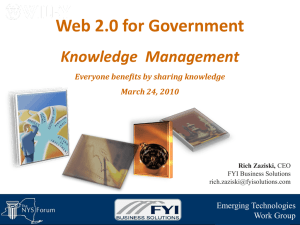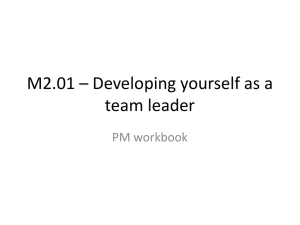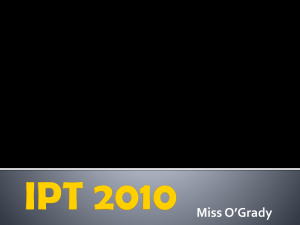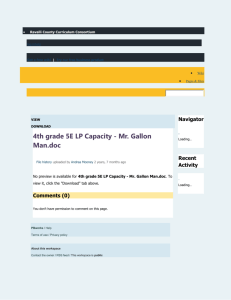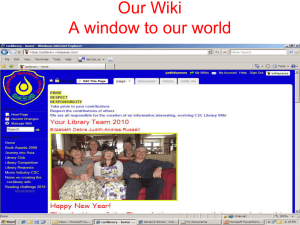Reflective Practice in Learning and Teaching Assessment 1
advertisement
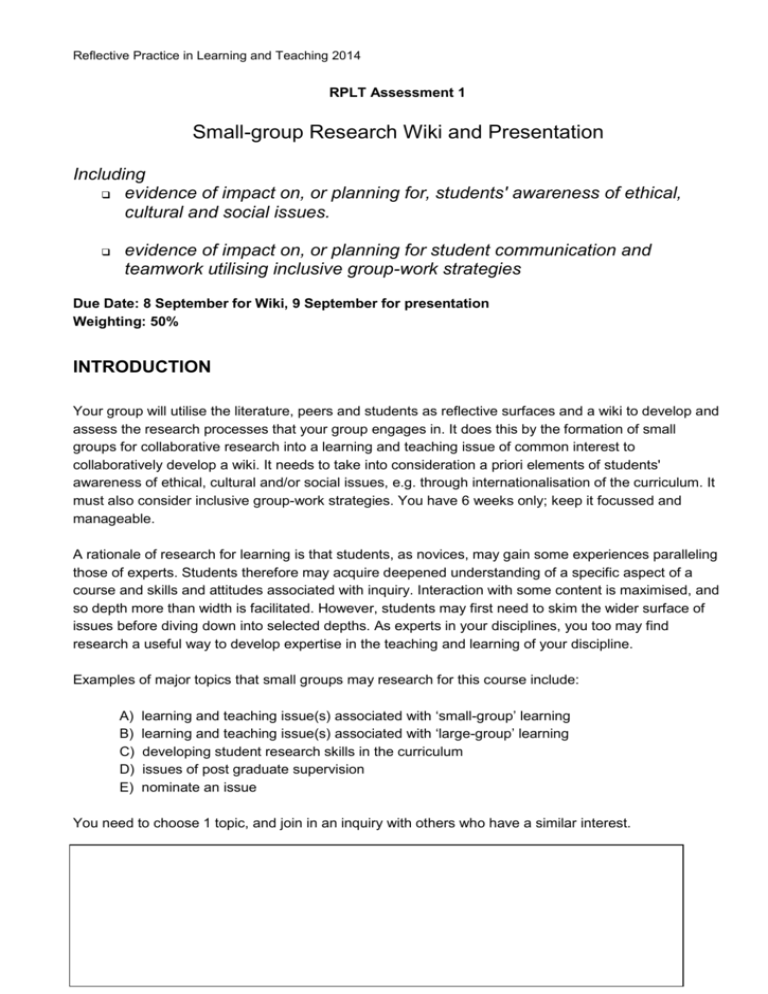
Reflective Practice in Learning and Teaching 2014 RPLT Assessment 1 Small-group Research Wiki and Presentation Including evidence of impact on, or planning for, students' awareness of ethical, cultural and social issues. evidence of impact on, or planning for student communication and teamwork utilising inclusive group-work strategies Due Date: 8 September for Wiki, 9 September for presentation Weighting: 50% INTRODUCTION Your group will utilise the literature, peers and students as reflective surfaces and a wiki to develop and assess the research processes that your group engages in. It does this by the formation of small groups for collaborative research into a learning and teaching issue of common interest to collaboratively develop a wiki. It needs to take into consideration a priori elements of students' awareness of ethical, cultural and/or social issues, e.g. through internationalisation of the curriculum. It must also consider inclusive group-work strategies. You have 6 weeks only; keep it focussed and manageable. A rationale of research for learning is that students, as novices, may gain some experiences paralleling those of experts. Students therefore may acquire deepened understanding of a specific aspect of a course and skills and attitudes associated with inquiry. Interaction with some content is maximised, and so depth more than width is facilitated. However, students may first need to skim the wider surface of issues before diving down into selected depths. As experts in your disciplines, you too may find research a useful way to develop expertise in the teaching and learning of your discipline. Examples of major topics that small groups may research for this course include: A) B) C) D) E) learning and teaching issue(s) associated with ‘small-group’ learning learning and teaching issue(s) associated with ‘large-group’ learning developing student research skills in the curriculum issues of post graduate supervision nominate an issue You need to choose 1 topic, and join in an inquiry with others who have a similar interest. Graduate Certificate in Education (Higher Education) ASSESSED PROGRAM GRADUATE ATTRIBUTES Graduate Attribute 5 Facilitates student communication and teamwork utilising inclusive group-work strategies. Evidences teamwork with colleagues. Graduate Attribute 7 Is involved in a collegial support system within discipline or intra-discipline, focusing on aspects of teaching and learning. Graduate Attribute 8 Explicitly facilitates students’ awareness of ethical, social and cultural issues and their importance in the exercise of professional skills and responsibilities. (see assessment rubric for details of marking criteria) WIKI COMPLETION AND PRESENTATION DATE: 8 September 2014 for Wiki completion. 9 September 2014 for Presentation (+ 2 page summary). TASK OVERVIEW In this small-group inquiry, each member will work collaboratively to: generate a clear, focussed and innovative research question or aim facilitate in an innovative manner, students’ awareness of ethical/ social/cultural issues and teamwork/communication utilise multiple source types for finding quality information (eg scientific catalogues, library databases, search engines) allocate group roles to manage workflow, and clearly detail this on a dedicated page of the wiki. identify a wide range of indicators of source credibility and reliability and apply these in your selection of information/data for inclusion. generate content relevant to question or project aim and draw on a wide range of sources. incorporate paraphrasing of information and present ‘new’ interpretations/context from that of original sources. Use a team approach to reviewing, evaluating, revising and editing group content contributions. use a wide variety of strategies to organise the Wiki with coherent linkage between and within all sections present a clear plan of use of findings utilise evidence when you self-assesses your research process w.r.t. Facets A to F In the Oral presentation (See Facet F of the marking criteria) communicate with a highly coherent presentation with clear and concise information 2 Reflective Practice in Learning and Teaching 2014 represent strongly & explicitly ethical dimensions and/or or socio-cultural dimensions integrate tightly the visual and spoken elements engaged audience in a way that provokes questions and comments present collaboratively, with the inclusion of whole team TIME REQUIREMENT (31 HOURS TOTAL) 1 hour in class time X 6 4 hours out of class time x6 (~3 hour research, 1hour ‘meeting’) 1 hour for each presentations in week 7 SESSION 1 TASK Decide on general research aim/question(s), allocate tasks and determine face-to-face meeting times and wiki contributions. 1. Discuss the ‘Task Overview’, above (15 minutes) Facets A to E concern the assessment of your research processes, including teamwork, through your use of the wiki. Note: your group will be required to submit a self-assessment, using Facets A to E, of your research process as evidenced by the wiki. You are also required to peer-assess another groups wiki, and respond to a peer-assessment of your wiki. 2. Brainstorm Research Questions (30 minutes) Brainstorm possible research questions on your topic. At this stage, the research questions may be specific or general and you may decide on one for the whole group, or for members to consider different components. 3. Allocate tasks and determine ‘meetings’ (15 minutes) Determine a plan of action for the next seven days: will someone focus on library-based resources, someone on internet and someone on journals? will each member contribute a summary of, say, 1 source to the wiki Where, when, how will you meet, and what will your objective(s) be? Is there any initiative that may be trialled with students sometime over the next few weeks? What will be the best use of the hour allocated to this task in Session 2? Can you plan this now? ASSESSMENT OVERVIEW i) Each group's wiki will be marked using Facets A to E in the marking rubric on the next page. ii) A panel-of-experts will appraise, using Facet F of the rubric, each groups collaborative presentation of their research/project outcomes. iii) Each group will self-assess their wiki (at the group level), using facets A to E. The presentations will occur on Tuesday 4th September (and 11 September if necessary). A 2-page summary of your findings is necessary for the audience and the panel. Graduate Certificate in Education (Higher Education) RPLT Assessment 1 Coversheet Your Name__________________________________________________________ Assignment Title _____________________________________________________ Submission date (actual) _______ Time required to do this assessment, including readings ____________ Word Count (not including references) ________ Do you give permission for this assessment to be used as an example for other Graduate Certificate in Higher Education participants? If so, sign below: Signed _________________________________ Date ________________ Would you prefer it to be used anonymously or with attribution?_________________ Do you give permission for this assessment to be used on the CLPD website? If so, sign below: Signed _________________________________ Date ________________ Would you prefer it to be used anonymously or with attribution?_________________ 4 Team Names ___________________ ___________________ ___________________ ___________________ ___________________ _ Small-group Research Wiki and Presentation Graduate Certificate in Education (Higher Education) Marking Rubric (50% weighting) Unsatisfactory Satisfactory Participants would benefit from more structure and guidance in 0 the below elements (1-4 for each) Participants’ research has flaws and/or is restricted in innovative elements (5-6 for each criteria) A. Embark & Clarify Respond to or initiate research and clarify or determine what knowledge is required, heeding ECST. Inquiry aim/research question(s) Inquiry aim/research question(s) not clearly stated on wiki or inappropriate Inquiry implicitly considers students ethical/ social/cultural issues and teamwork/ communication on wiki clear and appropriate but lacks focus Inquiry explicitly facilitates student awareness ethical/ social/cultural issues and teamwork/communication B. Find & Generate Search strategy is demonstrated Search strategy demonstrates Find and generate needed information/data using appropriate methodology. C. Evaluate & Reflect Determine and critique the degree of credibility of selected sources, information and data generated. Metacognitively reflect on the research processes used. Inquiry aim/research question(s) clear, focussed and innovative Inquiry explicitly facilitates, in innovative manner, students awareness of ethical/ social/cultural issues and teamwork/communication Search strategy demonstrates multiple source types for finding quality information (eg scientific catalogues, library databases, search engines) Content generated is relevant to Content generated is relevant to Content generated is relevant to project and draws on a wide range the inquiry, and primarily based on the inquiry but primarily drawn of sources. several sources. from one sources type only. Allocation of group roles to Allocation of group roles to manage Allocation of group roles to manage manage workflow is clearly workflow is specified on a workflow is briefly outlined on a detailed on a dedicated page of the dedicated page of the wiki. dedicated page of the wiki. wiki. Justifies use/inclusion of Identifies several relevant information, data and research processes without reference to relevant indicators. Minimal evidence of a team approach to reviewing, revising and editing group content contributions. Group self-assessment is ad-hoc. indicators of source credibility and reliability and provides appropriate rationale for use/inclusion of information. Evidence of a team approach to reviewing, revising and editing group content contributions. Group self-assesses utilises Facets A to E The group use basic strategies to E. Analyse & Synthesise Content largely restates F. Communicate & Apply Write, present and perform the processes, understandings and applications of the research, and respond to feedback, accounting for ethical, cultural, social and team (ECST) issues. Participants engage successfully in open research within structured guidelines (7-10 for each criteria) several different source types (eg catalogues and databases) for finding information. by a single source type (eg internet only) for finding information. D. Organise & Manage Organise information and data to reveal patterns and themes, and manage teams and research processes. Analyse information/data critically and synthesise new knowledge to produce coherent team understandings. Highly Satisfactory The group use several sound organise the wiki (eg headings, dot points etc.) but with little flow or connection. Problems with:_______________________ strategies to organise the wiki, with linkage between and within most sections. Problems with _________________________ Identifies a wide range of indicators of source credibility and reliability and fully applies these in selection of information/data for inclusion. Strong evidence of a team approach to reviewing, evaluating, revising and editing group content contributions. Group utilises evidence to selfassesses w.r.t. Facets A to E The group use a wide variety of strategies to organise the Wiki with coherent linkage between and within all sections Information from original sources is Content incorporates paraphrasing information from original sources used, with minimal integration. Applications of findings are left implicit integrated data but overall theme closely resembles that of the original sources Applications of findings are explicit of information and presents ‘new’ interpretations/context from that of original sources. Applications of findings are explicit and clear plan of use evident Communicates without coherence Communicates clear or concise Communicates utilising a highly Represents peripherally ethical, social, cultural and inclusive group-work dimensions. Visual and spoken elements are not well integrated Unengaged audience, as shown by a lack of questions, comments and/or interaction Presentation lacks collaboration information Represents ethical dimensions and/or or socio-cultural dimensions Visual and spoken elements are to some extent integrated Mildly engaged audience, shown by some questions, comments Presents somewhat collaboratively, yet one/ some dominant or passive © 2014 Adapted by John Willison, 18 from RSD www.rsd/edu/au coherent presentation with clear and concise information Strongly & explicitly represents ethical dimensions and/or sociocultural dimensions Visual and spoken elements are highly integrated Highly engaged audience, shown by level of questions, comments Presents collaboratively, with the inclusion of whole team Reflective Practice in Learning and Teaching 19
